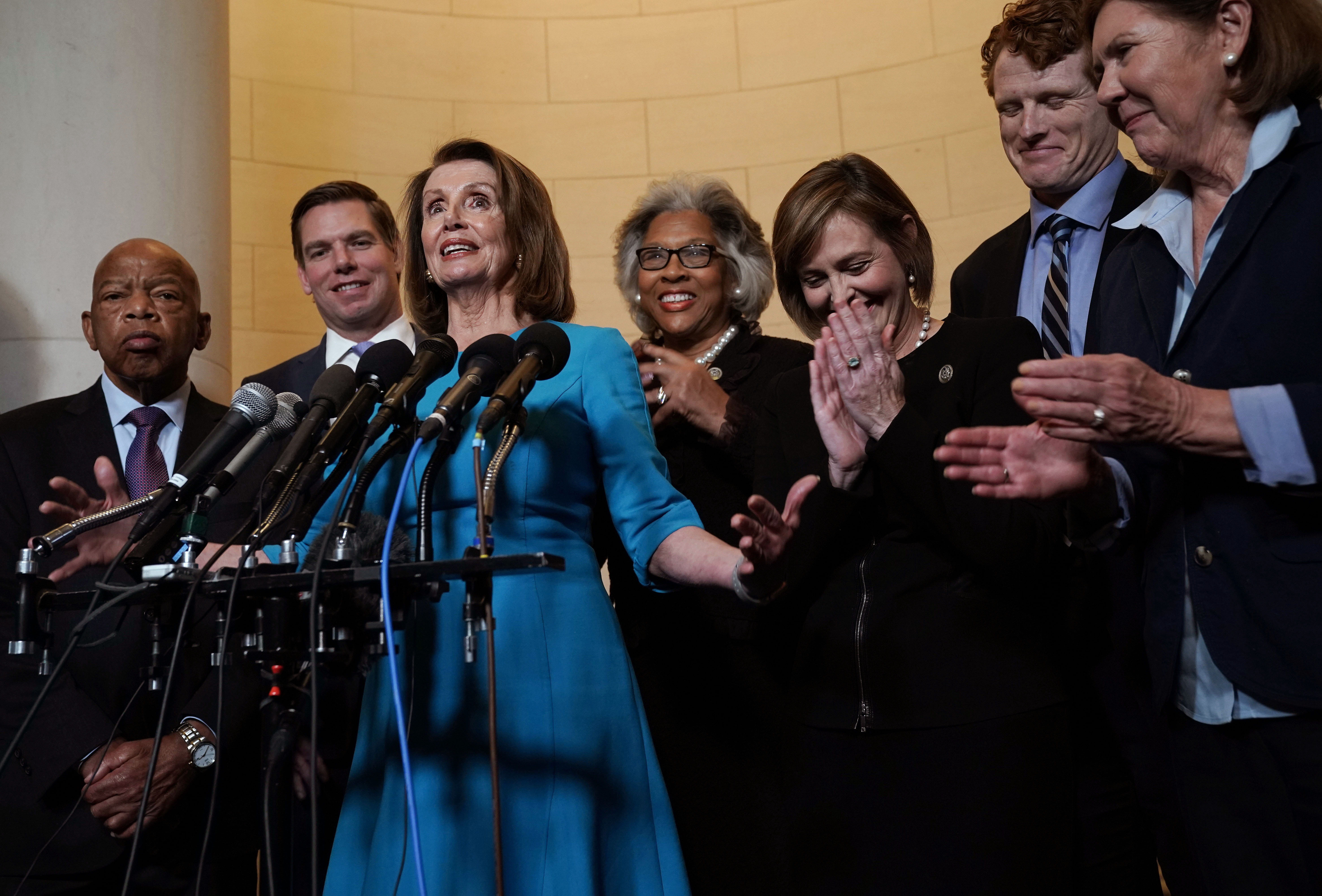How Nancy Pelosi is harnessing the new women's movement to take the House speakership
What does her success — and her strategy — reveal about the future of the Democratic Party?


A free daily email with the biggest news stories of the day – and the best features from TheWeek.com
You are now subscribed
Your newsletter sign-up was successful
We don't know for sure who the next Democratic nominee for president will be, but after Nancy Pelosi's victory in the first round of voting for speaker of the House, it's already pretty easy to guess who it won't be: Another white guy.
Most likely, it will be a woman.
There's lots of talk about Joe Biden making a comeback, about Beto O'Rourke somehow working better as a national candidate than as a Texas runner-up, about one more turn at the plate for Bernie Sanders. Each man has his fans, but what's more important is this fact: The energy in the Democratic Party at the moment is coming from women and people of color — and the top of the ticket in 2020 will reflect that.
The Week
Escape your echo chamber. Get the facts behind the news, plus analysis from multiple perspectives.

Sign up for The Week's Free Newsletters
From our morning news briefing to a weekly Good News Newsletter, get the best of The Week delivered directly to your inbox.
From our morning news briefing to a weekly Good News Newsletter, get the best of The Week delivered directly to your inbox.
Take a look at the new freshman class in Congress: The 101 new members in the House of Representatives "is the most racially diverse and most female group of representatives ever elected to the House," according to The New York Times. There are 23 people of color — most of them representing majority-white districts — and 42 women. An even more telling fact: Sixty percent of the seats flipped by Democrats in the recent midterm elections were won by women.
We saw a record number of women running for office in 2018, so this makes sense. And it shouldn't be a surprise. After all, the so-called "Resistance" has been powered by women since the very beginning: It feels like a million years ago at this point, but the first Women's March came the day after Donald Trump's inauguration. It filled the streets of Washington, D.C., and cities around the country. If Trump's election was at least partially the result of white backlash against the eight-year presidency of his African-American predecessor, women have shown, in the streets and at the polls, that they're more than capable of providing a backlash to the backlash.
Pelosi won the party's nomination for House speaker — despite growing hunger for newer and younger leadership — because her allies successfully labeled her opposition with an unforgettable hashtag: #FiveWhiteGuys.
The hashtag wasn't entirely fair. The group opposing Pelosi's nomination did include women and people of color — remember that Rep. Marcia Fudge (D-Ohio) was seen as her most likely challenger not so long ago — but the appeal was savvy: Democrats expect their political coalitions to have some diversity. Turn up your nose at "identity politics" all you like, but take a look at the incoming freshmen in Congress again: Of the 45 new Republicans, only two are women. One party looks somewhat like America, though admittedly it can do better. The other one looks like the locker room of a country club in a gated suburb.
A free daily email with the biggest news stories of the day – and the best features from TheWeek.com
Democrats, for now at least, are more democratic. It only makes sense their presidential ticket should reflect that.
In fact, it's almost a certainty you'll never again see the party's ticket led by two white men. The last time it happened was in 2004, and the idea that it could happen again feels positively antiquated. Some first-time voters in 2020 will have no memory at all of a presidential ballot filled with all white guys representing both parties. Considered against the breadth — and narrowness — of American history, that development is pretty astonishing.
This isn't to say that sexism isn't still a force in U.S. politics. A new poll from Kantar Public says that, while 52 percent of Americans would be "very comfortable" with a woman president, just 45 percent of men are cool with the idea. That's embarrassing — guys, we have to do better — but it's also an unfortunate reality of our politics.
Hillary Clinton was a flawed candidate in 2016, but you can argue that she was the only candidate that year who had a real chance of defeating Trump. Whatever his flaws, Trump excels at displays of dominance, and his march to the GOP nomination was a parade of metaphorical emasculations: "Little" Marco Rubio, "Low Energy" Jeb Bush, and so on. Clinton mostly sidestepped his puffery while she plugged away with a wonk's command of facts, figures, and plans.
And it almost worked. Clinton lost the election, but she won more votes. That's not insignificant.
The next Democratic nominee will need to possess that same steadiness and smarts. Luckily, the party seems ready with a deep bench of women in the Senate alone — Elizabeth Warren (Mass.), Amy Klobuchar (Minn.), and Kamala Harris (Calif.) all look ready to lead.
They're calling 2018 "the year of the woman." Dems should be ready in 2020 to give women — at least one of them, anyway — a whole four years. It's not just time; against Trump, it may be the best path to victory.
Joel Mathis is a writer with 30 years of newspaper and online journalism experience. His work also regularly appears in National Geographic and The Kansas City Star. His awards include best online commentary at the Online News Association and (twice) at the City and Regional Magazine Association.
